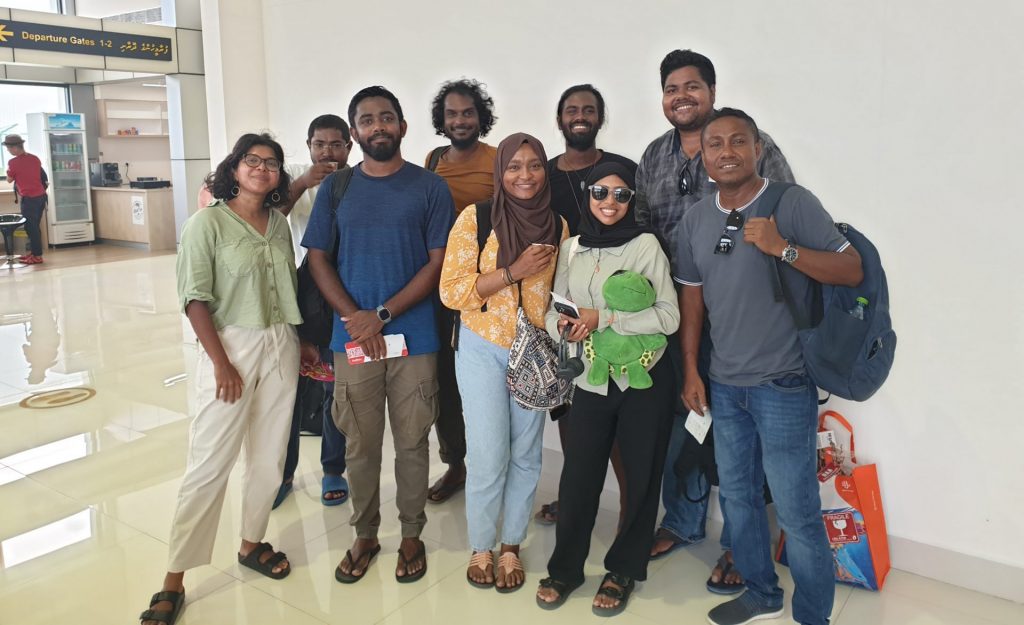Did you know that the country Maldives is 99% water? Everything Maldivians do comes from and is related to the ocean; the powerful and mysterious Indian Ocean that is home to countless wildlife that fly above and swim below the ocean surface — snorkelling, diving, are you picturing yourself on one of their beautiful, pristine beaches? Well, there is another sight to those beaches and it’s not a pretty one…
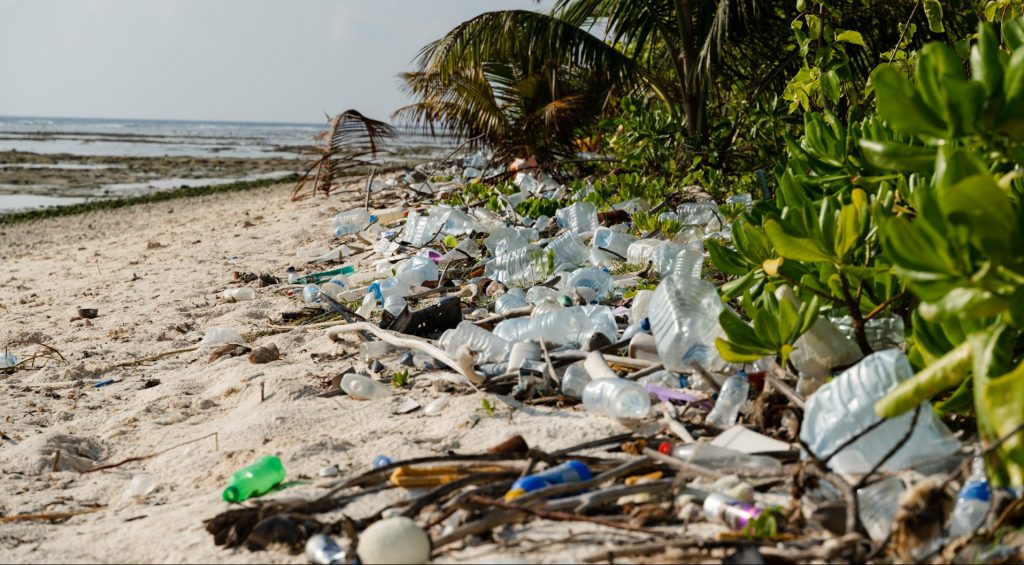
It is no secret that our planet’s health is in serious danger and that in the world’s oceans today, marine wildlife are facing the constant existential threat that is plastics; from single-use plastic bottles and bags, to toothbrushes, cigarette butts, and cups. But not just consumer goods; commercial fishing ships, which can use nets of up to 6,500 ft (2,000 m) in length and 650 ft (200 m) in depth, lose or abandon vast amounts of fishing gear each year, which can drift for years at sea. These discarded nets, drifting FADs and other fishing equipment, become known as “ghost gear.” Although commercial net fishing is banned in the Maldives, ghost gear that was lost or discarded elsewhere in the Indian Ocean washes ashore and has a devastating impact on local island ecosystems by damaging reefs, injuring and killing marine wildlife trapped in floating nets.

Therefore, IPNLF-Maldives teamed up with the Lhohi Council, Lhohi school, Women’s Development Committee (WDC) and local NGOs of Lhohi Island, Olive Ridley Project (ORP) and Zero Waste Maldives for a beach combing trip to remove plastic from the beach, the ocean, and even to take off litter that was stuck on trees!
Lhohi is one of the islands of Noonu Atoll in the Maldives with a population of around 900 people and it is as pristine as you would imagine. That is… If it weren’t for the single-use plastics and abandoned ghost gear that’s washing up the coastline.
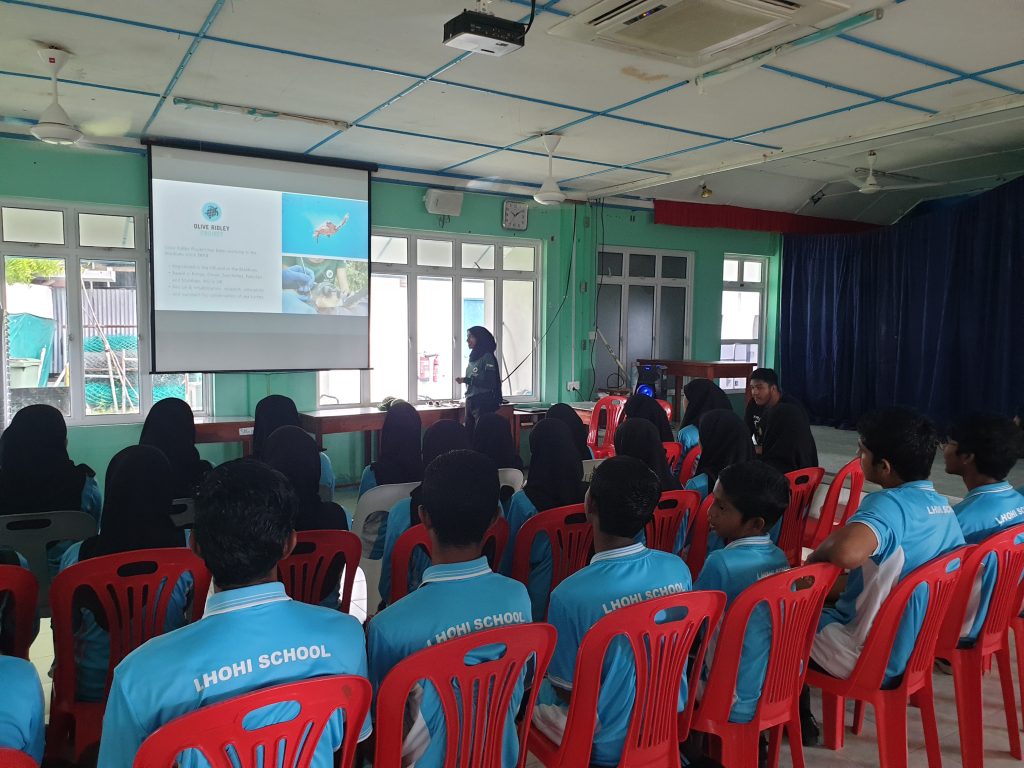
On June 12th, 2023 the IPNLF-Maldives team together with the rest of the volunteers geared up for the beach combing trip to the nearby island of ‘Hunandhumaa Vattaru’ a beautiful uninhabited island in Noonu Atoll. On arrival, Afrah Ismail, co-founder of Zero Waste Maldives, briefed the plan of action for the day and everyone went into groups to remove all the plastic from the beach and nearby flora. Risha Ali Rasheed, volunteer and Educational Outreach Officer lead the teams. The women of WDC played an active role in cleaning the beach and serving food and drinks to all involved. The local savouries made by the WDC team added more excitement to the work as everyone was enjoying both work and the amazing food.
Among the volunteers were students from the Lhohi school who had always played an important role in terms of preserving the environment and it was witnessed by the enthusiasm shown by the school students in the cleanup. The energetic team of Surf Square did a tremendous job by snorkelling around the island reef and removed two gillnets which were stuck in the reef. Surf square is one of the most active NGOs of the island who promote surfing and play a vital role in beach cleanup programs. By the end of the day, the team collected all sorts of plastic bottles, marine debris, and destructive fishing nets!
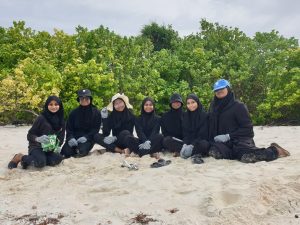
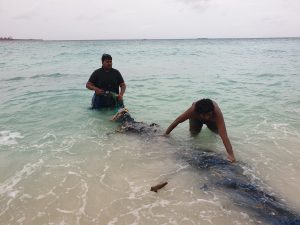

Everywhere our IPNLF teams and our fishers go, we see first hand how much impact plastic has on the environment. Plastic pollution is a global problem in which the contribution to abandoned, lost, or otherwise discarded fishing gear (ALDFG) remains underexposed. A groundbreaking report was released in 2019 that revealed the extent of the problem: 86% of the large plastics that make up the Great Pacific Garbage Patch are fishing nets, and 85% of the plastic pollution on sea mounts, ocean ridges, and the sea floor is fishing equipment. Buoys alone make up 58% of all large plastics floating on the ocean’s surface. Currently, it is estimated that 10% of the plastic in the ocean comes from lost fishing gear, amounting to between 800,000-1.2 million tonnes annually, however, the real figure is likely to be much higher.
Despite the minimal fishing gear pollution coming from one-by-one fishers, and the much lower threat that losses of these gears pose to ecosystems, we do still recognise and pursue opportunities to have our fisheries further reduce their contribution to fishing gear pollution. However, where we can’t reduce every bit of plastic in one-by-one fishing operations, we can contribute to the clean-up of our oceans and achieve plastic neutrality, which all IPNLF members have also committed to achieving by 2025.

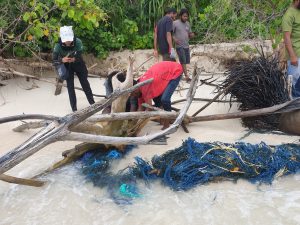

Since 2020, IPNLF and their local partners have successfully implemented Plastic Neutrality Projects that focus on investing in a circular economy, developing and implementing best practices, and sharing inspiring mitigation (reduction of plastics) stories from our fleets, the fishermen, and from our members, while also advocating on a global scale for all fisheries to be held more accountable for the damage caused by their lost or abandoned fishing gears.
Recent projects include the Joanna Toole Ghost Gear Initiative in The Maldives and the Azores Ghost Gear Competition 2021 and 2022, which has one-by-one tuna fisheries pioneering opportunities for fishers to be the solution to plastic pollution issues. The Azorean fleet proudly achieved a plastic positive status by removing over 1,000 times more plastic than the fleet would ever lose themselves!
With our partners and actions like these, we try to make the world a better place for all.
